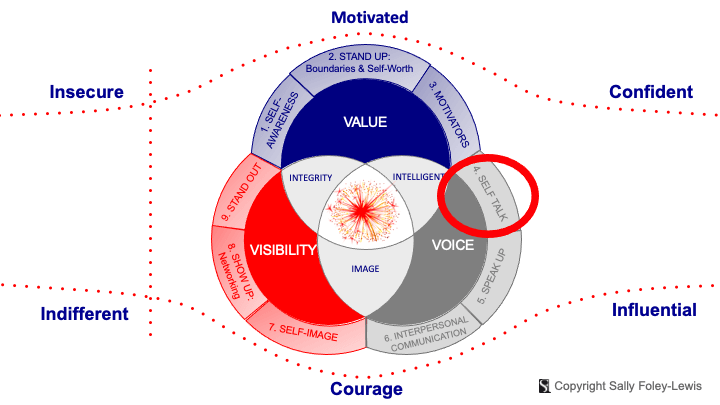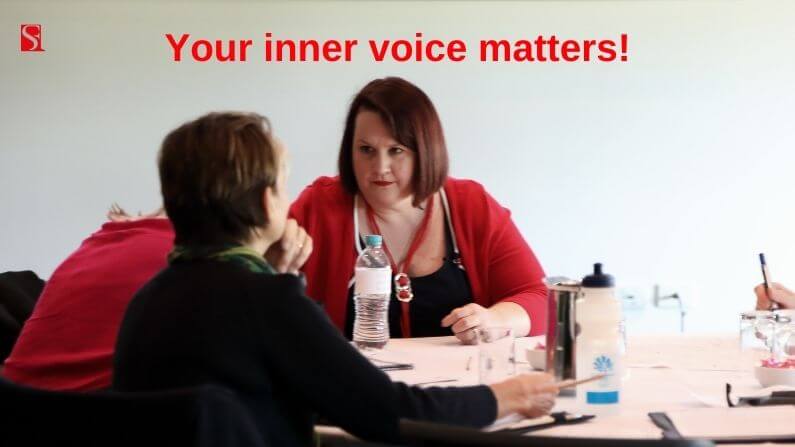“You idiot, Sally!”
This was my most common self-talk phrase when I made mistakes. I even said it out aloud when I made mistakes. At one level it was a throw-away line but it was, until I learnt better, a message to myself that became a strong and ingrained destructive practice. The more I said it the more it became part of me.
Then one day, just after I had berated myself aloud for a mistake a dear friend said to me, “If I made that mistake would you say that me: “you idiot”?”
“Of course not”, I replied somewhat upset that she’d think I’d think that of her.
She went on, “I’d never say that to you, but I notice you say it a lot when you make a mistake, even ridiculous tiny mistakes, I’d prefer it if you didn’t speak to my friend like that.”
What an amazing gift to receive.

It’s hard to have strong and positive self-leadership when you’ve got negative self-talk nattering away in your mind.
Self-talk is what you say to yourself, your inner dialogue, and is influenced by your subconscious mind. Your self-talk reveals your thoughts and beliefs and can be positive and negative.
Research by psychologists from Queen’s University in Canada have deduced that we have around 6,200 thoughts in a single day. (There are myths abound of up to 70,000 thoughts per day but citing the source is a challenge.)
When it comes to chemicals in our brain: dopamine for the positive, cortisol for the protection. So many common incidents that occur throughout the day trigger cortisol to warn us and protect us. This triggers stress and negative thoughts and as such we tend to have more negative thoughts than positive thoughts each day.
The impact of self-talk on self-leadership will show up in openness to creativity, challenges and feedback. Negative self-talk will potentially show up as stressed, lacking resilience and procrastination, while more positive or constructive self-talk will show up as more emotionally intelligent, thoughtful, insightful, more capable (or less flappable) during crisis, uncertainty and change.

Types of Negative Thinking
All or nothing: Being absolute in your thinking, e.g. you tend think always, never, no one, every one, every thing, every time.
“I’ll never be able to have a decent feedback conversation.”
“I’m never going to delegate successfully.”
“No one at work cares about me.”
When you read these statements you can easily see that they are not true, and do nothing for happiness.
Sure, some people might not like us but it’s not true that no one cares.
One, even a few, failed attempts at delegating doesnt’ mean it won’t ever work.
With structure, calm and planning, feedback conversations can be easier, less stressful and challenging.
Glass is (half) empty: Always looking for the bad will result in only finding the bad.
If you go hunting for problems in the team, you’ll find them. While resolving problems is good, consistently being on the look out and pointing out the bad is not great.
It makes it difficult for people to want to spend time with you and may also motivate people to avoid sharing anything with you, keeping you outside the loop which doesn’t serve you when you’re trying to manage and lead them.
The truth is, there’s a lot of good all around you. Even with COVID and 2020 being such a strain and stressful year, there were silver linings.
More drama than a soap opera: Making a catasrophy out of a situation, especially something that may never happen, causes unnecessary stress.
“We’ll probably all get laid off.”
“China will bomb us.”
“We’ll never go back to the office safely.”
Ask yourself, how true is this and how likely is this going to happen. Sure, we can’t predict the future but there are very, very few worst case scenarios that actually happen.
Imposter: Thinking that you will be caught out as being not the right person for the job you’re in.
“Why did they promote me, surely they made a mistake.”
Focus on your strengths and what those stengths contribute to the team and your work.
Creating a ‘brag book’ often stops the imposter creeping in. A brag book is a folder of all the emails, cards, notes, awards, achievements, etc., that demonstrate your value and contribution. It’s external validation that can help strengthen your own internal validation.
Mind reading: Thinking that others think poorly of you is negative mind reading. If you’re like me, you’re not psychic, and as such we can’t read minds. Mind reading in this context is like making up stories.
E.g.: Do you have an argument in your head with a colleague before you know you have to meet with them?
Do you run through an awful, challenging, difficult conversation with an employee, in your head, and then avoid that employee all the next day?
Asking and having an open and respectful dialogue is how you get the truth … and develop quality relationships.
Sentenced: Guilty! Do you keep a list of all the bad things you’ve done? Do you define yourself by all that you’ve failed, missed or fudged? Giving yourself a guilt trip and then defining yourself by all that’s not gone to plan often results in trying less, hesitating, and feeling as though you don’t deserve happiness.
This can directly lead you to not speak up in important meetings, missing opportunities, not ‘going for it’ when you might actually be the perfect choice.
Do you identify with any one of these?

So let’s turn the negative self-talk around…
Start being more present to your thoughts and how you talk to yourself.
Ask a trusted friend or colleague to let you know when they hear you speak your self-talk out aloud, and noitce if it is positive or destructive.
Catching yourself in negative self-talk may take time and practice, you’re catching a well ingrained habit, and catching yourself is starting a new habit after all. Keep at it.
Once you catch yourself, forgive yourself for the negative self-talk – or at least don’t give yourself a hard time for it, maybe even praise yourself for catching it. Then change it into a positive thought instead.
As stated in a Psychology Today article, “everyone engages in self-talk. But much depends on the way we do it.”
The article goes on to share psychologist, Ethan Kross’ findings on self-talk:
“In a series of groundbreaking experiments, Kross has found that how people conduct their inner monologues has an enormous effect on their success in life. Talk to yourself with the pronoun I , for instance, and you’re likely to fluster and perform poorly in stressful circumstances. Address yourself by your name and your chances of acing a host of tasks, from speech making to self-advocacy, suddenly soar.”
So these days, it’s, “Nice one Sally, you caught that so you can fix it.”




